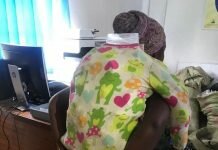The Rwanda-backed M23 armed group has committed summary executions and forced recruitment of civilians in eastern Democratic Republic of Congo, Human Rights Watch said. The Congolese army is responding to the M23’s offensive by collaborating with ethnic militias with abusive records.
The warring parties have increasingly appealed to ethnic loyalties, putting civilians in remote areas of North Kivu province at a heightened risk.
“Rwanda-backed M23 rebels in North Kivu are leaving behind a growing trail of war crimes against civilians,” said Thomas Fessy, senior Congo researcher at Human Rights Watch.
Recent investigations by the United Nations Group of Experts on Congo, as well as Human Rights Watch research, provide significant photographic and other evidence that Rwanda is not only giving logistical support to the M23, but that Rwandan troops are reinforcing or fighting alongside the armed group inside Congo. The Rwandan government has denied supporting the M23 rebels.
The renewed hostilities by the M23, the Congolese army, and various other armed groups has forced more than 520,000 people to flee their homes, according to the United Nations.
Between October 2022 and January 2023, Human Rights Watch interviewed in person and by phone 48 survivors and witnesses of abuses as well as victims’ family members, local authorities, activists, UN staff, security personnel, members of armed groups, journalists, and foreign diplomats.
A 38-year-old woman said she was at home in Kishishe with her husband and their three children on November 29 when a group of M23 fighters kicked the door open. “They took my husband and our son by force outside, and told me ‘Stay in the house, if you come out, we will kill you!’” she said. “So I closed the door behind them. They shot them a few meters away, I could see them through a hole [in the door].” Her husband was seriously injured but survived. Their 25-year-old son died.
Human Rights Watch found that on November 29, M23 rebels summarily killed at least 22 civilians in Kishishe following fighting with factions of Mai-Mai Mazembe, Nyatura and the Democratic Forces for the Liberation of Rwanda (Forces démocratiques de libération du Rwanda, FDLR).
In a December 3 statement, the M23 rejected murder allegations and said that eight civilians had been killed by “stray bullets” during the fighting.
In May 2022, Congolese President Felix Tshisekedi said he opposed any alliance between Congolese military commanders and the armed groups. However, according to security sources, in late 2022 Congo sent two senior army officers to oversee military operations in Masisi, both of whom are former Hutu militia leaders who have retained close links to ethnic-based militias with poor rights records. This has raised fears of further retaliatory attacks and ethnic violence against civilians on both sides.
Other M23 Killings and Abuses
Elsewhere in Rutshuru territory, Human Rights Watch confirmed the killings of at least 13 additional civilians by the M23 in October and November.
On October 28, near Rugari, M23 rebels opened fire on a bus and two motorbikes transporting civilians who were fleeing the fighting. A 35-year-old woman said from her hospital bed that she and four of her children were on one motorbike, while her other two children were on another bike. She said her 17-year-old daughter was killed, and her 14-year-old son wounded. At least two other children, ages 5 and 7, were killed in the attack.
Four men, ages 22 to 26, said that M23 rebels forced them to carry supplies and ammunition, do chores at their military camps, and take part in fighting. They said they found themselves with dozens of other young people who had also been forcibly recruited, including some brought in from Rwanda.
“They would whip us and order us to scout for [Congolese military] positions,” a 25-year-old said. “We had no shoes. They would beat us and leave us in the rain. I was taken for two months.” He escaped at night while on the lookout for government troops.
A 26-year-old said:
After one month, they took us to Chanzu [near the borders of Rwanda and Uganda]. It must have been like a headquarters as this is where they organized the fighting and there were so many fighters: it was an impressive camp. All fighters come through there, new recruits are trained there before they are sent to the front line. A group of about 50 youth arrived from Rwanda [when I was there]; they had come through the forest. After a week of training, they were given weapons and sent to fight.
On November 21, M23 rebels went through Butare where they forced 10 men to transport goods for them while on their way to Bambo, near Kishishe. The bodies of seven of them were found together in Mburamazi, just outside Bambo, the following day. The brother of one victim said, “I went with family members of four other victims to retrieve their bodies. We buried three on the spot.” Three more bodies were found three days later, according to local groups.
On November 26, M23 rebels killed at least three civilians when they opened fire near the market of Kisharo while chasing militiamen. Human Rights Watch received credible reports that another three civilians were also killed by the M23.
In a January 27 statement sent to Human Rights Watch, the M23 spokesperson Lawrence Kanyuka rejected Human Rights Watch’s findings and denied that the M23 executed civilians or forcibly recruited men to fight. He added that “civilians may be used to transport food for the military,” but “in return for payment as agreed.”
Coalition of Militias and Collaboration with Congolese Army
The resurgence of the M23 rebel group since late 2021 led several Congolese armed groups to form a coalition to fight “the aggressor.” Most of these militias are organized along ethnic lines and some were previously rivals. As Human Rights Watch recently documented, this coalition, called the Patriotic Coalition, was formed in Pinga in May 2022, and fought the M23 either alone or alongside Congolese troops until August.
Most of these militias gradually returned to their respective strongholds in August. But following the M23 offensive in late October and its advance into the Bwito chefferie and Masisi territory in November, the coalition resurfaced. It took on a prominent role on the front line with the apparent backing of some senior Congolese army officers.
These armed groups have been implicated in serious human rights abuses in their strongholds. Human Rights Watch has previously documented widespread abuses by forces under the command of Guidon, the NDC-R leader, who remains under UN sanctions.
Some of these militias, most notably Nyatura factions and the APCLS, have often fought alongside FDLR fighters.
Several security sources, including a high-ranking army officer, told Human Rights Watch that the Congolese government deployed Gen. Janvier Mayanga Wabishuba and Gen. Hassan Mugabo to oversee military operations in Masisi territory.
PARECO has been implicated in raping women and girls, killing civilians who opposed their activities or whom they accused of being collaborators with their enemies, and raiding villages for cattle, goats, and other goods. Mayanga maintained contacts with PARECO as well as the FDLR while the Congolese army fought the M23’s first iteration, the CNDP, from 2006 to 2009. Mugabo was one of the founding members of PARECO and its deputy commander.
Human Rights Watch has received credible information that more meetings took place in January, allegedly to coordinate operations against the M23 in Masisi. Three security sources, two fighters from Nyatura Abazungu, and one APCLS fighter said that although militia were fighting alone on the front line, they were at times receiving ammunition and food supplies from Congolese army officers.
President Tshisekedi’s administration should address historical discrimination, land and customary conflicts, and ensure accountability for past abuses, Human Rights Watch said.









































